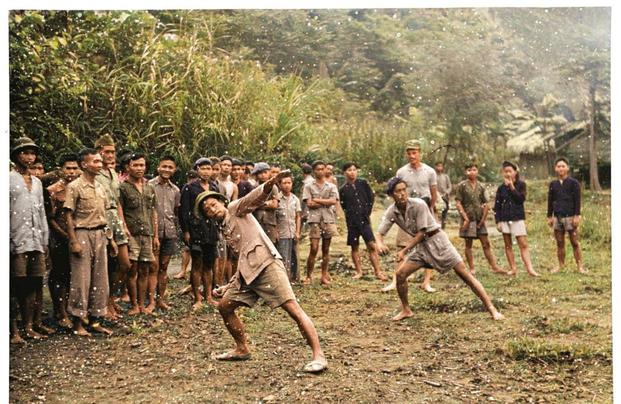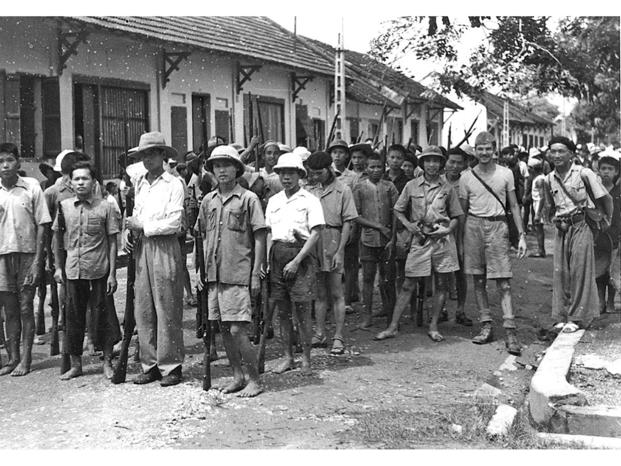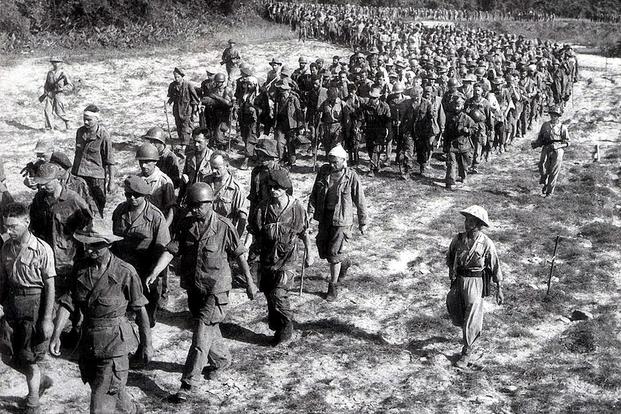In the final months of World War II, a small team of American commandos parachuted into the mountains of northern Vietnam to train Ho Chi Minh’s guerrillas to fight Japan. They were members of the OSS Deer Team, a short-lived mission that joined U.S. troops and Vietnamese revolutionaries against a common enemy—two decades before the United States would return to Vietnam as their adversary.
OSS Missions in the Jungles of Vietnam
In July 1945, the U.S. Office of Strategic Services—the wartime forerunner of the CIA—sent an eight-man special operations team into northern Indochina to link up with the Viet Minh, the nationalist resistance fighting Japan’s occupation. Operating under the OSS China Theater command in Kunming, the mission was led by Maj. Allison K. Thomas.
On July 16, 1945, a C-47 flew the Americans over the mountains from China and dropped them by parachute into a clearing near Tân Trào, about 100 miles north of Hanoi. They were met by Gen. Vo Nguyen Giap and a contingent of Viet Minh fighters who led them to a nearby mountain village. Within days, the OSS men began training about 50 guerrillas in small-unit tactics, weapons use, demolitions, and first aid.
Air-dropped supplies from China equipped the group with M1 carbines, Thompson submachine guns, bazookas, mortars, and grenades—rare and highly needed weapons in the theater. Their goal was to build a trained local force to strike Japanese positions ahead of a planned Allied invasion of mainland Asia.
The American-Vietnamese Alliance
Shortly after the Americans arrived, they met with Ho Chi Minh, who was already known to the OSS for rescuing and escorting a downed U.S. pilot the previous year. He was seriously ill, suffering from fever and stomach pain. Medic Paul Hoagland treated him with quinine, sulfa drugs, and penicillin—a combination that likely saved his life.
Ho was described as charismatic, curious, and friendly toward the Americans. He reportedly showed less warmth toward the French or French-speaking members of the group. According to OSS accounts, he singled out one of them, Lt. Montfort, saying, “This man is not an American. Who are you trying to kid? This man is not part of the deal.” Ho ordered Montfort and several others arrested and deported.
Despite the tension, Ho took a special liking to Maj. Thomas and often spoke about his years in the United States, where allegedly, he worked as a dishwasher in New York decades earlier. The OSS formally listed him as an agent under the codename “Lucius,” though the Deer Team simply called him “Mr. Hoo.”
Thomas later recalled that he once asked Ho to his face if he was a communist. Ho simply replied, “Yes, I am. But we can still be friends, can’t we?” For the Americans on the ground, the Viet Minh were simply a local partner in the war’s final campaign; their political ideology meant little.

Fighting the Japanese in Vietnam
By August 1945, Japan’s empire was collapsing but still had large numbers of troops in the region. OSS reports show that the Deer Team joined Viet Minh units in skirmishes near Tân Trào and Thái Nguyên. The Americans offered tactical advice as Gen. Vo Nguyen Giap’s fighters used their newly supplied U.S. weapons against Japanese patrols.
Soon after, word of the atomic bombings on Japan reached the agents. To celebrate the oncoming end of the war and their recent victories, the American and Vietnamese troops celebrated by getting drunk together.
As Japan’s surrender approached, the Viet Minh moved to seize control of northern Vietnam. The OSS men watched the first days of the August Revolution, when Ho’s forces took power in towns and villages across the region. On Sept. 2, 1945, Japan formally surrendered, ending the Deer Team’s mission—but not the complications that would follow.

A New Nation and the Betrayal
On Sept. 2, 1945, Ho Chi Minh proclaimed the Democratic Republic of Vietnam in Hanoi. Standing before thousands, he began his declaration by quoting directly from the U.S. Declaration of Independence: “All men are created equal; they are endowed by their Creator with certain inalienable rights.”
According to OSS officer Archimedes Patti, Ho asked for a copy of Jefferson’s declaration beforehand, and OSS staff in Hanoi provided one. The officials displayed American and Vietnamese flags and played the national anthems of both nations as a sign of friendship and cooperation.
On his last night in the country, Maj. Thomas dined with Ho, who told him, “I want to thank each of you for what you have done for us. We are truly grateful. You are welcome to come back at any time.” Ho allegedly gifted a signed copy of his declaration to Thomas.
French colonial officials—many of them former Vichy officers—soon returned, demanding that France’s authority in Indochina be restored. They were furious that the Americans had worked with Ho’s partisans instead of them. OSS officers, including Patti, Thomas and the rest of the Deer Team were quickly pulled out and sent home.
By 1946, French troops were openly fighting the Viet Minh—the same guerrillas trained and supplied by American operatives only a year earlier.
From Allies to Enemies: The Indochina Wars
Through the late 1940s and early 1950s, Vietnam suffered the First Indochina War—a brutal conflict between Ho Chi Minh’s Viet Minh and returning French colonial forces. Ho appealed repeatedly to Washington for help in securing Vietnam’s independence, even sending several letters to President Harry Truman directly. None were answered.
Facing pressure from Paris, the Truman and Eisenhower administrations chose to back France. By the early 1950s, the United States was paying nearly 80 percent of France’s war costs, supplying aircraft, weapons, and even transport pilots through the Civil Air Transport program. Despite that support, French forces were crushed at Dien Bien Phu in May 1954, ending nearly a century of colonial rule.

At the Geneva Conference that summer, Vietnam was temporarily divided at the 17th Parallel. Ho Chi Minh’s communist-led government ruled the North, while an anti-communist regime under Ngô Đình Diệm took power in the South. The two sides were supposed to hold nationwide elections in 1956 to reunify the country, but Diệm—backed by Washington—refused, fearing a Viet Minh victory.
Former Viet Minh fighters who remained in the South soon launched an insurgency with northern support. The United States responded by sending military advisers, weapons, and eventually combat troops to keep South Vietnam from falling. Ho began reaching out to China and the Soviet Union for support instead. The conflict became the Second Indochina War, better known as the Vietnam War, which raged for almost two decades before Saigon fell to communist forces in 1975.
For decades, the OSS Deer Team’s mission was forgotten. Its files remained classified, and the devastation of the Vietnam War overshadowed the brief moment when Americans and Vietnamese fought on the same side. Many of the former OSS agents later expressed their regret and disappointment in how the Vietnamese were treated by the U.S. and for American intervention in the region.
When the story resurfaced in the 1990s through declassified OSS records and memoirs, historians recognized it as one of the strangest ironies in U.S. military history. The first Americans in Vietnam had fought alongside Ho Chi Minh’s forces, not against them.
Story Continues
Read the full article here



